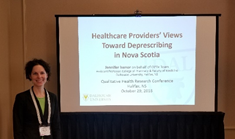The arrival of COVID-19 brought rapid and sweeping changes to the primary health care system—a system that accounts for more than three-quarters of billed health care appointments in Canada.
Seemingly overnight, virtual care options became available, primary care practices were redesigned, and large-scale triage of COVID-19 was introduced. Patients and health care providers alike had to adapt quickly and the impact of all these changes is unclear.
A new multi-province study led by Dr. Emily Gard Marshall of Dalhousie University, seeks to better understand how the needs of patients and primary care providers are being met before, during, and after COVID-19.
The study, called PUPPY* for short, has received a one-year grant of more than $400,000 through the Canadian Institutes of Health Research (CIHR) COVID-19 Rapid Research Response funding opportunity.
With this funding, the research team will undertake a series of surveys and interviews to gather insights into the experiences of patients, policy-makers and the three most common primary care providers—family doctors, nurse practitioners, and pharmacists.
To gain a more complete picture of practices, the qualitative findings will be supplemented by an analysis of relevant administrative health data, including health care billings and prescribing data. These data are collected routinely through the provision of health care services, and will be accessed through Health Data Nova Scotia (HDNS) and the Data Access Support Hub (DASH)—making the study a test case for the portal which was recently established by the Health Research Data Network Canada (HRDN).

The team also plans to perform a scan of policy changes in response to COVID-19. Follow-up surveys with patients and providers will further clarify their needs and the challenges they face in accessing and providing care, respectively. From this research, they aim to find ways to help connect patients to primary care that can be scaled up and implemented quickly—during COVID-19 and after the pandemic.
“This research is badly needed to help us understand the challenges people face in accessing primary care from both the provider and patient perspectives. Ultimately, our goal is to help people access the right care, with the right provider, at the right time,” said Dr. Emily Gard Marshall, Associate Professor, Dalhousie University Department of Family Medicine Primary Care Research Unit and Nominated Principal Investigator on the PUPPY study.
Responding quickly, together
Where primary health care falls under the jurisdiction of the provinces, there are bound to be variations in how it is delivered. The PUPPY study intends to use these variations as learning opportunities, by comparing primary care access in Ontario, Québec, and Nova Scotia.
It’s an ambitious program of work, but one the multi-provincial research team is well-placed to undertake. The study is being co-led by Drs. Jennifer Isenor (Dalhousie University), Mylaine Breton (Université de Sherbrooke), Michael Green (Queen’s University) and Maria Mathews (Western University). The multidisciplinary research team includes Patient Partners and co-investigators from the Maritime SPOR SUPPORT Unit (MSSU), the BRIC NS PIHCI Network, the Nova Scotia Health Authority (NSHA), and the Nova Scotia Department of Health and Wellness, as well as policy-makers in Québec and Ontario.
“Together, we’re able to build on the existing research infrastructure and mobilize our efforts in a way that speaks to the tremendous collaborative nature and flexibility of the research community here in Nova Scotia and in other parts of Canada too,” said Dr. Amy Grant, Senior Health Policy Researcher, Maritime SPOR Support Unit and Co-Investigator on the PUPPY study.
“To have leaders from health authorities and government supporting this research and making data available speaks to the fact that we live in a country where we know it’s important to learn and do better—and we can’t do that without the evidence,” added Dr. Marshall, reflecting on how quickly colleagues from across the country joined forces to collaborate.
While using similar methods across different populations will yield a much richer understanding of the trade-offs that occur and any unintended consequences of policy, the inclusion of different perspectives in the research is as much about building a holistic view of primary health care and propelling the conversations that are needed after the research is complete.
“Every voice matters in finding solutions and this team is made up stakeholders with different perspectives who are committed to listening to each other and working together to advance change,” said Ms. Sarah Peddle, a Patient Partner on the PUPPY study.
Ms. Peddle was motivated to effect change by her own struggle to find a family doctor, and understands first-hand how limited access to primary health care can negatively impact patients and their continuity of care.
Rethinking roles to support providers and ensure patient access
Primary health care providers are often the place where people go when they have questions, are worried, or when they are struggling emotionally and physically. They help patients to navigate and coordinate their care. For many patients who do not have regular access to a family doctor, pharmacists are increasingly filling the gap.
“Pharmacists’ scope of practice—the services that they can provide to patients—expanded prior to the arrival of COVID-19 and we’ve seen this trend continue during COVID-19. For many patients, pharmacists have become an accessible point of contact for their primary care needs during the pandemic,” said Dr. Jennifer Isenor, Associate Professor at the College of Pharmacy at Dalhousie University and Co-Principal Investigator on the PUPPY study.
 project looking at the prescribing patterns of Nova Scotia pharmacists, and collaborating with Dr. Marshall on another study of the barriers and enablers pharmacists face in managing patients without a regular primary care provider in Nova Scotia (the PUP-Study). Dr. Marshall is also leading the CIHR-funded CUP-Study evaluating centralized waitlists in attaching patients to primary care in Nova Scotia, Ontario, and Québec. These existing collaborations provided a necessary foundation for the PUPPY study.
project looking at the prescribing patterns of Nova Scotia pharmacists, and collaborating with Dr. Marshall on another study of the barriers and enablers pharmacists face in managing patients without a regular primary care provider in Nova Scotia (the PUP-Study). Dr. Marshall is also leading the CIHR-funded CUP-Study evaluating centralized waitlists in attaching patients to primary care in Nova Scotia, Ontario, and Québec. These existing collaborations provided a necessary foundation for the PUPPY study.
“We have our previous studies looking at primary care before COVID-19 and with the PUPPY study, we can learn from the ways that COVID-19 is changing primary care. I’m optimistic that we are going to have some extensive changes in care—changes that can be sustained for the better,” said Dr. Isenor.
Ultimately, the PUPPY study aims to provide the evidence and the relationships needed to strengthen primary health care in Canada.
“We need to have really strong data and then bring people together—the policy-makers and the patients and the different health care providers—to have challenging conversations about how all primary care providers can work to their full scope of practice and feel supported, while ensuring that there’s also enough access for patients, such that they know that there’s options for them to get the care that they need. I’m hoping that by collecting this kind of data and having these people partnered from the beginning, we might propel some of those conversations forward,” said Dr. Marshall.
“As a primary care researcher, I know some things, but I don’t have all of the other perspectives. Bringing in new perspectives is challenging. It’s much easier to do research that’s very narrowly focused, but I don’t think we’ll ever get to the answers about how we support patients and providers, and sustain a system that’s publicly funded, without them all involved,” added Dr. Marshall.
*The full name of the PUPPY study is Problems Coordinating and Accessing Primary Care for Attached and Unattached Patients Exacerbated During the COVID-19 Pandemic Year: A Longitudinal Mixed Methods Study with Rapid Reporting and Planning for the Road Ahead.
Follow the PUPPY Study on Twitter
Read the COVID-19 Rapid Research Response funding announcement